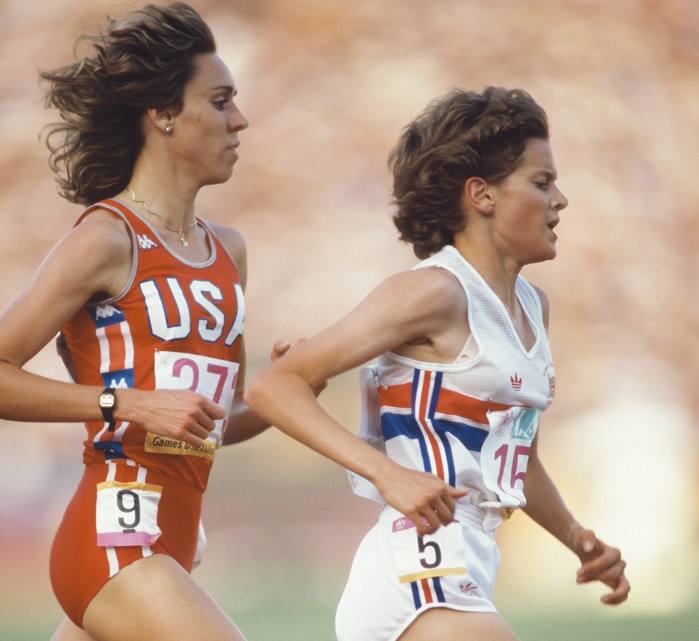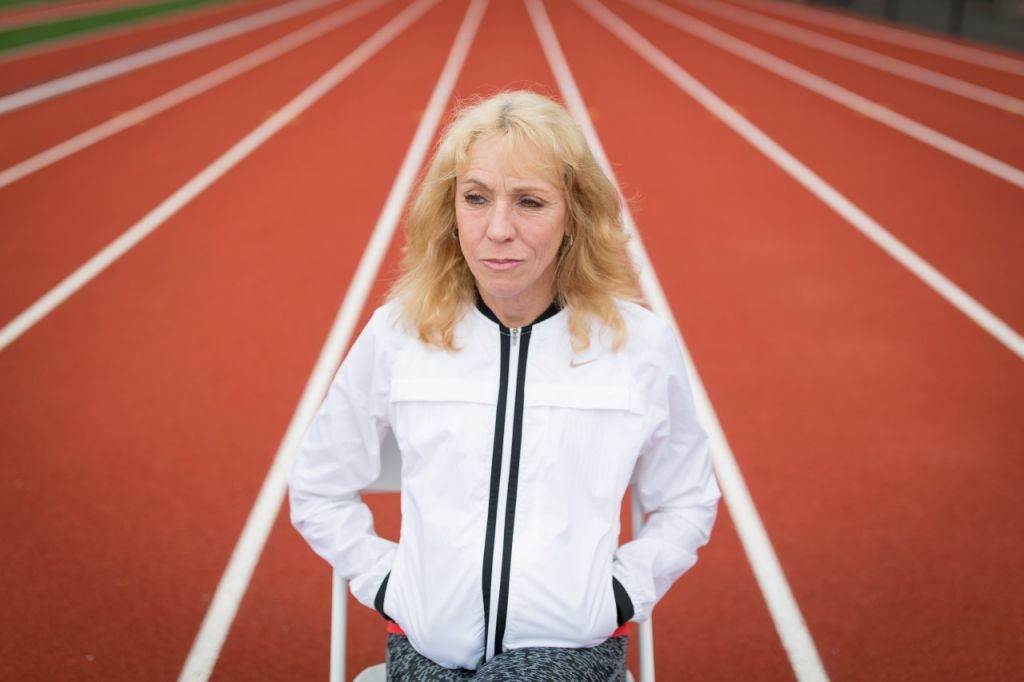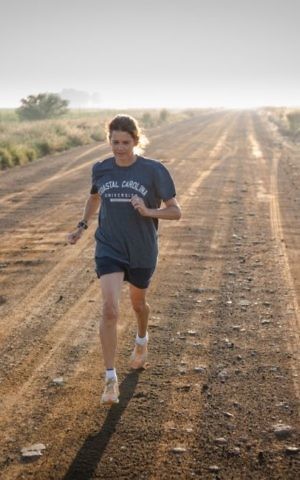From rivalry to reunion: Mary Decker and Zola Budd meet after 30 years
Producer John Battsek and director Daniel Gordon team up on thought-provoking documentary, The Fall, about fateful clash at 1984 Olympics
“They both could have had such gloriously rewarding lives – and yet at every point, life just decided they were going to take a dark path.”
Reflecting on his latest documentary, The Fall, producer John Battsek contemplates just how different things could have been for two of the world’s top athletes in 1984 – Zola Budd and Mary Decker – had one of the most controversial moments in sporting history never occurred.
South African-born Budd, who was representing Britain and famously ran barefoot, spectacularly collided with American favourite Decker in the women’s 3,000m race during the 1984 Olympics in Los Angeles.
Get The Jewish News Daily Edition by email and never miss our top stories Free Sign Up
In one fateful moment, Decker fell to the ground while Budd, reacting to a hostile crowd, dropped behind the rest of the pack, shattering the gold medal-winning dreams of both women.
Now, more than 30 years later, Battsek and director Daniel Gordon have reunited Decker and Budd and retraced the events leading up to the day that would leave the pair inextricably linked forever.
Battsek, who picked up Academy Awards for One Day In September, a documentary examining the murder of 11 Israeli athletes at the 1972 Olympics in Munich and Searching For Sugar Man, has worked with Gordon over the past 15 years.
Notably, the Jewish director and producer have a penchant for making sports-related documentaries with human-interest stories at their core. Most recently, they received wide attention for their hard-hitting documentary, Hillsborough, which aired on the BBC earlier this year.
“Inevitably sport has an organic and inherent dramatic element to it, so there’s always great drama in most sporting events,” explains Battsek, executive producer at Passion Pictures.
“But sporting drama is just one level of what makes these films so powerful. All of them have this magic ingredient, which enables them to transcend that dramatic sporting story and become about a number of things bigger than just that.
“You can be completely disinterested in long-distance running, but go and see The Fall, because it’s also about childhood, parenting, politics, growing up and the struggles of life.”
The film, which airs on Sky Atlantic tomorrow night, reveals the poignant and at times, tragic moments that Budd and Decker endured during their formative years.
For Budd, her life started out on a small farm outside the city of Bloemfontein, where she was kept largely sheltered from the unsavoury politics of apartheid ravaging her country.
She was very close to her sister, Jenny, who tragically died aged 24, from an adverse reaction to chemotherapy for a tumour.
After that, the young sportswoman poured her anger into running, and at 17, achieved fame by breaking the women’s 5,000m world record – previously held by Decker – by six seconds.
But the International Amateur Athletics Association refused to ratify her time because of the sporting boycott against South Africa – a boycott that also stopped Budd from competing at the Olympics.
To get around this problem, the young teenager was persuaded by a lucrative deal with The Daily Mail and her overbearing father to adopt British nationality and compete for Great Britain. But on arrival in the UK, she was greeted with hostility by apartheid campaigners. Often the crowd could be heard jeering and booing – at times, even spitting in her face – as Budd made her way around the track.
In the film, Budd maintains that her naive upbringing meant she knew little about apartheid – and claimed not to know who Nelson Mandela was – a sticking point for protesters who claimed she was lying and wanted to hold her up as the poster girl for racist South Africa.
Even Battsek admits he was “incredulous” about Budd’s ignorance of the issue. “But then I asked some of my South African friends, given how Zola Budd grew up, if this could be true and they categorically said it could.
“This girl didn’t even know what it was she was being spat at for. She lived in a community where those people weren’t in the newspapers and she was simply unaware of Mandela’s existence in any way, shape or form.”
In contrast, Decker appeared to have the perfect, all-American childhood. By the time she was 14, she was already recognised as a world-class runner and had the world at her feet.
But things did not go to plan. On a professional level, she found herself too young to enter the 1972 Olympics, too injured to compete in 1976 and disappointed again in 1980, when the US boycotted the Olympics in Moscow.
In her personal life, all was not well either. When her parents separated, Decker’s father rebuffed any attempts to stay involved. “He said I didn’t need attention, because I already had the attention of the world,” says Decker.
When one of her mother’s new boyfriends became abusive, the devastated teenager packed her bags and left home.
What becomes clear as The Fall progresses is that the personal hardships of both young women propelled them towards becoming the greatest athletes of their time.
The striking parallels are ones that have not escaped Gordon, who describes the similarities as “incredible”.
But equally the Sheffield-based producer was surprised to discover that Budd and Decker knew relatively little about one another before agreeing to take part in the documentary – and were not due to see the film until just a few days before its release this week.
“I just can’t help thinking what will it be like when they both see the film,” adds Battsek. “You can already see how they look at each other in a different way having shared bits of experience, but I suspect you’ll find when the film ends they’ll be all over each other.
“In some ways that’s one of the most rewarding parts of this process. For the contributors, the project has this really profound, cathartic and healing effect on them, which is always a joy to behold.”
By the film’s end, the pair – both now in their 50s – are reunited for the first time in more than 30 years. While the emotions surrounding their famous duel at the 1984 Olympics are evidently still raw, there is certainly a sense of reconciliation.
For Battsek, their reunion is perhaps the sweetest ending to a bittersweet story.
He adds: “The thing that I feel most profoundly about them and their story is just the randomness of life. They were both so close to success and yet at every point they ended up with the exact opposite. The aspect of fate is so delicate and seems so unfair for these two girls.
“Her former coach calls Decker the greatest American athlete of all time – but you wouldn’t know it, because she never really got to reap the rewards of that. Equally for Zola, it could have been such a triumphant life, but because of the politics, her father and The Daily Mail, she was just miserable. I find that profoundly moving.”
The Fall airs on Sky Atlantic tomorrow (Friday) at 9pm and will be released in
Picturehouse Cinemas nationwide

Thank you for helping to make Jewish News the leading source of news and opinion for the UK Jewish community. Today we're asking for your invaluable help to continue putting our community first in everything we do.
For as little as £5 a month you can help sustain the vital work we do in celebrating and standing up for Jewish life in Britain.
Jewish News holds our community together and keeps us connected. Like a synagogue, it’s where people turn to feel part of something bigger. It also proudly shows the rest of Britain the vibrancy and rich culture of modern Jewish life.
You can make a quick and easy one-off or monthly contribution of £5, £10, £20 or any other sum you’re comfortable with.
100% of your donation will help us continue celebrating our community, in all its dynamic diversity...
Engaging
Being a community platform means so much more than producing a newspaper and website. One of our proudest roles is media partnering with our invaluable charities to amplify the outstanding work they do to help us all.
Celebrating
There’s no shortage of oys in the world but Jewish News takes every opportunity to celebrate the joys too, through projects like Night of Heroes, 40 Under 40 and other compelling countdowns that make the community kvell with pride.
Pioneering
In the first collaboration between media outlets from different faiths, Jewish News worked with British Muslim TV and Church Times to produce a list of young activists leading the way on interfaith understanding.
Campaigning
Royal Mail issued a stamp honouring Holocaust hero Sir Nicholas Winton after a Jewish News campaign attracted more than 100,000 backers. Jewish Newsalso produces special editions of the paper highlighting pressing issues including mental health and Holocaust remembrance.
Easy access
In an age when news is readily accessible, Jewish News provides high-quality content free online and offline, removing any financial barriers to connecting people.
Voice of our community to wider society
The Jewish News team regularly appears on TV, radio and on the pages of the national press to comment on stories about the Jewish community. Easy access to the paper on the streets of London also means Jewish News provides an invaluable window into the community for the country at large.
We hope you agree all this is worth preserving.
-
By Laurent Vaughan - Senior Associate (Bishop & Sewell Solicitors)
-
By Laurent Vaughan - Senior Associate (Bishop & Sewell Solicitors)
-
By Laurent Vaughan - Senior Associate (Bishop & Sewell Solicitors)
-
By Laurent Vaughan - Senior Associate (Bishop & Sewell Solicitors)
























